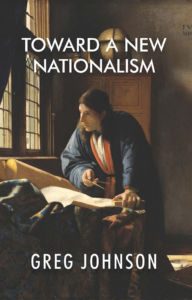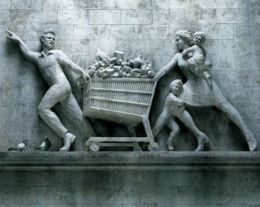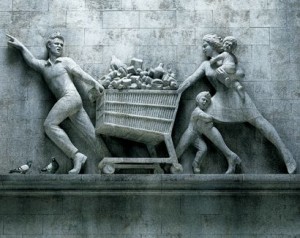“An Ethnostate, If You Can Keep It”
1,493 words
If the current regime disappeared, and I were given a free hand to create an ethnostate, this is what I would do. I am going to focus simply on policies and institutions, not practical questions about how we would gain and keep the power to implement them.
1. First and foremost, I would declare that America is the homeland of the American people, a people of European stock. From day one, America would be normatively white — meaning that white standards would be imposed on all — even though its population would be multiracial.
2. Beyond that, only whites would have civil rights, i.e. be able to participate in government. Non-whites would, however, retain all their human rights to life, property, due process, etc. They would be resident aliens.
Then I would get to work on reducing diversity.
3. If you find yourself in a hole, stop digging. Thus I would halt all non-white immigration, legal and illegal. I would, of course, be open to white immigrants, although in small numbers and with the expectation that they would assimilate to American culture and institutions, once they have been suitably improved.

You can buy Greg Johnson’s The White Nationalist Manifesto here
4. Then I would set to work on emigration policy. In the chapter of The White Nationalist Manifesto on “Restoring White Homelands,” I lay out a program for repatriating post-1965 legal and illegal immigrants and their descendants. I would also send Jews and our pre-1965 Asian and Mestizo immigrant populations to their homelands as well. I argue that this can be done in an orderly and humane way simply by reversing the incentives and trends currently leading to white demographic decline, then we let time work for us, for a change.
5. From the territory of the United States, I would create homelands for African-Americans and Hawaiians. Indians and Eskimos would be citizens of their tribal nations alone.
6. I would begin deglobalizing the US economy, to return high-paid manufacturing jobs to the homeland. Consumers would pay more, but be better citizens for it.
7. I would restore the traditional roles of men as protectors and providers and women as wives and mothers. A goal of economic policy will be that a white family with four children could be supported by a single income. I would also strengthen the marriage bond by abolishing no-fault divorce and enforcing laws against adultery and alienation of affections.
8. Since every society encourages either eugenic or dysgenic fertility patterns, I would institute gentle eugenic pressures to increase the fertility of the smartest and healthiest. Even in our circles, there is a reluctance to embrace the more snobbish and statist elements of old-fashioned eugenics. But we are still benefitting — and so will our posterity for all time to come — from the supposedly horrendous sterilization of some 60,000 mentally retarded and mentally ill people early in the last century. Can any liberal humanist policy claim similar success?
9. What sort of government should an ethnostate have? I don’t favor dictatorship, absolute monarchy, or the one-party state. They are too brittle, corruptible, and dangerous. I particularly recommend two books of political philosophy as guides: Aristotle’s Politics and Hegel’s Philosophy of Right. Following Aristotle, I believe the best form of government is a mixed regime with monarchical, aristocratic, and popular elements. Following Hegel, I favor clearly delimiting the realms of family, civil society (including the private property economy), and the state. Such a system carves out a large space of individual freedom, but it also recognizes the necessity of limiting individual freedom (especially in the economic realm) when it conflicts with the common good of society. Finally, following the long tradition of republican thinkers from antiquity to the present, I think heredity is a bad way of choosing leaders.
10. If this sounds familiar, it should. Most white societies today have mixed regimes. Moreover, some of the heights of white civilization have been reached under mixed regimes.
But if the mixed regime is a good form of government, why are all our governments today so bad? The answer has less to do with the regime itself and more to do with the people who rule and are ruled. Laws and institutions are just tools. They must be staffed and used by people. If the people are rotten, even the best regimes can be subverted. Thus the real revolution is not a change of regime, but a change of the people, especially the people who staff and use it.
There are patriots who would fight intensely to preserve the American flag but care nothing about the replacement of whites with non-whites. But this can work to our advantage. We can lessen opposition to deep and long-term revolutionary changes if we simply leave the superficial aspects of the system pretty much intact.
11. Governments are tools for attaining the common good of society. Every tool, however, must be used by particular individuals. Every time a tool is used, one has the choice of using it well or badly. Every system of government involves such moments of decision on every level, every minute, every day. This means that a very large government must somehow surmount myriad points of failure every single day. Given that, it is little wonder that any political system can be subverted. The wonder is that any of them produce anything good at all.
Given the boundless corruptibility of laws and institutions, we cannot put our faith in any of them, for they are only as good as the men who staff them, from the cop on the beat all the way to the highest courts and councils of state. Thus the true constitution of any society lies in the character of the people who dwell there, especially those who exercise power. Statecraft is ultimately soulcraft. This is why modern political philosophy is such a disaster.
12. Aristotle believed that good government could be maintained by two forces: virtue and vice. The purpose of the state is to make human well-being possible, which requires cultivating moral and intellectual virtues, including public spirit: an identification with the common good and a willingness to sacrifice oneself to promote it.

You can buy Greg Johnson’s Toward a New Nationalism here.
But we can’t always depend on the virtues of our fellow men. Thus by empowering the monarchical, aristocratic, and popular elements of government to check and balance one another in order to preserve their own resources and prerogatives, Aristotle also harnesses greed and fear to promote good government.
The error of modern political thought from Machiavelli onward is to think that we can dispense with virtue and build a good society solely on vice, that we can dispense with public spiritedness and rely entirely on private interests. Immanuel Kant expressed this idea best when he said that even a society of devils could enjoy good government if they had good laws. He did not explain why devils would set up good laws in the first place. Thus an ethnostate needs to return to a classical politics of virtue. We cannot privatize morals and education.
13. If a regime can fail at every level, then any ultimate assurance of good government must lie outside the regime itself. To create a pro-white regime, we must create a pro-white leadership caste. There are two elements to this task.
First, there is education, which must be universal and public. A core component should be moral education. We must shape education on all levels, and we cannot confine it to the schools. We also need to recognize the role of the culture as a whole, including the entertainment industry, which must be taken out of the hands of hostile aliens.
Second, we need an organization that finds and promotes the best people from all areas of society and inculcates an ethos of leadership, which requires broadening one’s moral concern to the common good of society, and even beyond that to the interests of the race as a whole. In my essay “Lessing’s Ideal Conservative Freemasonry,” I discuss the German Enlightenment thinker Gotthold Ephraim Lessing’s model for such an order. Whenever broadminded people meet to discuss the welfare of the whole, we have Freemasonry in Lessing’s sense. Our nation, and our race, need a guiding intelligence that lies above and beyond all other social institutions. Beyond that, we need to ensure that all key positions in society are staffed by members of that network.
In short, we need to build a “Deep State,” a term coined by Turkish Islamists for the guardians of the Kemalist constitution, which consists of an informal network extending through the Turkish military, intelligence services, judiciary, and bureaucracy, overlapping with elements of organized crime. The Deep State works to thwart Leftists, Islamists, Kurdish separatists, and other enemies of the state. It has even launched military coups. You may dismiss this as a “paranoid conspiracy theory,” but it actually sounds like a good idea to me. Every system needs a prime mover to set it in motion and last line of defense to preserve it from destruction.
So there you have it, from alpha to omega. An ethnostate, if you can keep it.




